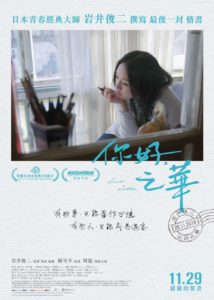Last Letter
你好,之华
Hong Kong/Japan/China, 2018, colour, 16:9, 112 mins.
Director: Iwai Shunji 岩井俊二.
Rating: 7/10.
Japan’s Iwai Shunji makes a generally strong Chinese debut with a riff on his 1995 classic Love Letter.
A town in Liaoning province, northeast China, Jan 2018. Librarian Yuan Zhihua (Zhou Xun) attends the funeral of her older sister Yuan Zhinan. Afterwards, her teenage daughter Zhou Saran (Zhang Zifeng) goes to stay for a couple of days at the home of her cousin, Yuan Mumu (Deng Enxi), swapping places with Yuan Mumu’s younger brother, Yuan Chenchen (Hu Changlin), who comes to stay with Yuan Zhihua and her husband Zhou Wentao (Du Jiang). When an invitation arrives for her late sister to attend a 30th anniversary high-school reunion, Yuan Zhihua goes in her stead, intending to announce the news of Yuan Zhinan’s passing. But when she’s mistaken at the dinner for 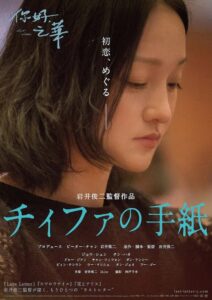 Yuan Zhinan she goes along with it, and afterwards, while waiting for a bus, she’s approached by Yin Chuan (Qin Hao), a writer now based in Shanghai who rushed up specially for the reunion. Still not admitting she’s not Yuan Zhinan, Yuan Zhihua pretends to recognise him; later, he texts her, annoying her husband who smashes her mobile phone. At work she secretly writes to Yin Chuan – still in the guise of her sister – about everyday trivialities and gives no return address. After several letters he finally replies, using the address of her family home. However, her daughter and niece see the letter first, and the two girls secretly reply to it, pretending to be Yuan Zhinan. Yin Chuan responds with a long letter about their mutual past at high school: how he joined the school as a transfer student from
Yuan Zhinan she goes along with it, and afterwards, while waiting for a bus, she’s approached by Yin Chuan (Qin Hao), a writer now based in Shanghai who rushed up specially for the reunion. Still not admitting she’s not Yuan Zhinan, Yuan Zhihua pretends to recognise him; later, he texts her, annoying her husband who smashes her mobile phone. At work she secretly writes to Yin Chuan – still in the guise of her sister – about everyday trivialities and gives no return address. After several letters he finally replies, using the address of her family home. However, her daughter and niece see the letter first, and the two girls secretly reply to it, pretending to be Yuan Zhinan. Yin Chuan responds with a long letter about their mutual past at high school: how he joined the school as a transfer student from 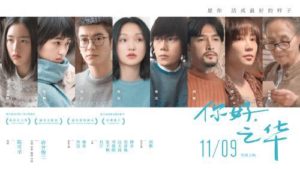 Beijing, how Yuan Zhihua took a liking to him, how he actually became entranced by her elder sister Yuan Zhinan, and how the jealous Yuan Zhihua once hijacked one of his love letters. Meanwhile, Yuan Zhihua persuades a retired teacher (Li Chunming) to let her use his address for Yin Chuan’s letters. But then one day Yin Chuan turns up there in person.
Beijing, how Yuan Zhihua took a liking to him, how he actually became entranced by her elder sister Yuan Zhinan, and how the jealous Yuan Zhihua once hijacked one of his love letters. Meanwhile, Yuan Zhihua persuades a retired teacher (Li Chunming) to let her use his address for Yin Chuan’s letters. But then one day Yin Chuan turns up there in person.
REVIEW
More than two decades after his feature debut Love Letter ラヴレター (1995), Japanese film-maker Iwai Shunji 岩井俊二 returns to some of the same themes in Last Letter 你好,之华, in which a wife rediscovers her first, high-school crush following the death of her elder sister. Iwai’s first movie shot and set in mainland China, it’s a kind of belated present to his many fans there, as well as another riff on the power of shared memories via the written word. Anchored by a sensitive performance from Mainland actress Zhou Xun 周迅, plus strong playing by the teenage Zhang Zifeng 张子风 and Deng Enxi 邓恩熙 (in double roles), it lacks the semi-mystical tone of the original film – which also explored the possibility of parallel lives – and has a highly manufactured storyline that requires several leaps of faith by the audience, especially in the early stages. But the key cast keep it interesting, delivering an emotional impact in the final scenes that shows Iwai at his best. In the Mainland the movie delivered a modest RMB80 million.
Despite a few weaknesses, the gentle drama finds Iwai on his best form since Hana & Alice 花とアリス (2004), in a career that’s been drifting the past decade with none of the impact of his early successes that also included Swallowtail Butterfly スワロウテイル (1996), April Story 四月物语 (1998) and All about Lily Chou-Chou リリイ・シュシュのすべて (2001). 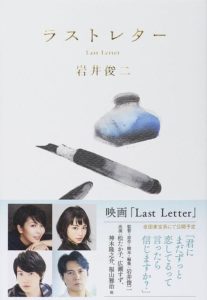 After the English-language flop Vampire (2011), Iwai’s career started to recover with the engrossing, if over-long, A Bride for Rip Van Winkle リップヴァンウィンクルの花嫁 (2016), but Last Letter finds him finally back on his game and on more settled ground.
After the English-language flop Vampire (2011), Iwai’s career started to recover with the engrossing, if over-long, A Bride for Rip Van Winkle リップヴァンウィンクルの花嫁 (2016), but Last Letter finds him finally back on his game and on more settled ground.
Iwai has a history of developing his films’ themes and material across other platforms, as well as staying with his characters, and Last Letter looks like joining that club: a Japanese version is to be released in 2019 (see poster, left), and Iwai has plans to write a novel centred on the main character. [The Japanese version was finally released in Japan in Jan 2020.] Though the film returns to some of the themes of Love Letter from the mellower perspective of middle age – Iwai is now 55 – the jolt to make it actually came from an online drama that he wrote and directed in South Korea, the four-part, 66-minute Chang-ok’s 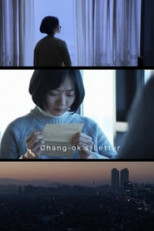 Letter 장옥의편지 (2017, see left), starring actress Bae Du-na 배두나 | 裴斗娜 as a middle-class housewife whose world is shaken. (Interestingly, Love Letter also had outside inspiration – the best-selling 1987 novel Norwegian Wood ノルウェイの森 by Murakami Haruki 村上春树.)
Letter 장옥의편지 (2017, see left), starring actress Bae Du-na 배두나 | 裴斗娜 as a middle-class housewife whose world is shaken. (Interestingly, Love Letter also had outside inspiration – the best-selling 1987 novel Norwegian Wood ノルウェイの森 by Murakami Haruki 村上春树.)
So it’s fair to say that Last Letter is not simply a cynical cash-grab in the Mainland market: Iwai’s following has existed since Love Letter was released there in 1999, and he’s on record as saying that he first needed the right conditions to make a film in China. In that regard, significant help came from Hong Kong co-producer Chen Kexin 陈可辛 [Peter Chan] at a crew level, as well as Mainland writer Wu Nan 吴楠 (The End of Year 一年到头, 2008; Feng Shui 万箭穿心, 2012) with her Chinese dialogue. The film feels authentically mainland Chinese even when the camera of Kanbe Chigi 神户千木 – Iwai’s d.p. since A Bride for Rip Van Winkle – often makes the wintry northeast locations look Japanese. (Not difficult, given the region’s history as onetime Manchuria.)
But though dialogue and behaviour ring true, the way in which they are presented is typical of Iwai – a slightly dreamy, fairytale quality within a realistic setting that is beholden to no nationality. Though also set in wintertime, Last Letter has a greyer, chillier feel than Love Letter. In the flashbacks to the leads’ younger days, Kanbe’s images have a slightly warmer look; but in general the roaming, handheld photography is cool, with none of the snowy poetry that Iwai’s previous d.p., the late Shinoda Noboru 筱田昇, gave to Love Letter. Instead, the warmth in Last letter is purely internal, stemming from the characters’ feelings.
At the heart of the drama lies Yuan Zhihua who, after her older sister’s funeral, attends a high-school reunion in her place and ends up impersonating her and meeting her sister’s first love. This 20-minute set-up requires several suspensions of belief: no good reason is given for Yuan Zhihua going along with the impersonation, nor for her starting a correspondence with the sister’s first love. There’s also a clumsy scene of her husband smashing her mobile phone which is only there to explain why she writes letters rather than texts. Zhou’s quiet, interior playing gives no clues to what her character is thinking in these early stages, though once the set-up is past she gradually engages the viewer with a very subtle performance. After her impressive turn in Our Time Will Come 明月几时有 (2017), it’s another masterclass in minimal acting by Zhou, now 44 and for once playing a role around her real age.
In no way, however, does Zhou dominate the film. Equally engrossing – especially given the theme of how the written word can bind people across the generations – are the performances of Zhang, 17, as the lead’s daughter, and Deng, 13, as her cousin, with both actresses also playing teenage versions of their mothers in the flashbacks. The older-looking Deng, who’s had daughter roles in The Devotion of Suspect X 嫌疑人X的献身 (2017) and A Cool Fish 无名之辈 (2018), has an ethereal calm that conceals more complex feelings, while the younger-looking Zhang evinces the same kind of sad sparkiness she showed in How Are You 李梅和韩梅梅 昨日重现 (2017) and Go Brother 快把我哥带走 (2018). Zhang has the showier role but both performances are complementary.
Alas, the film isn’t so well cast on the male side. In scruffy hair and glasses (he’s a writer!), Qin Hao 秦昊 is largely a blank wall as the man in the middle, and young newcomer Bian Tianyang 边天扬, 15, is almost as inexpressive in the flashbacks, weakening what should be the film’s main emotional pole. Such lopsidedness also extends to other male characters: Yuan Zhihua’s husband is featureless, while the young nephew’s story is surplus to requirements. Making the strongest impression is Shanghai singer-actor Hu Ge 胡歌, 36, in a convincing cameo as the late sister’s alcoholic husband.
The English title explicitly links the film with Love Letter, though the Chinese title has a completely different meaning (“Hello, Zhihua”). Shooting was mostly in the northeast city of Dalian, Liaoning province, where, by coincidence, Iwai’s mother was actually born and spent her childhood.
CREDITS
Presented by Beijing JQ Spring Pictures (CN), We Pictures (HK), Rockwell Eyes (JP), Zhejiang Dongyang Xiaoyuzhou Movie & Media (CN), Horgos Eyes Pictures (CN), K.Pictures (CN). Produced by We Pictures (HK), Rockwell Eyes (JP).
Script: Iwai Shunji. Original story: Iwai Shunji. Chinese dialogue: Wu Nan. Chinese script editing: Chen Jiayi. Photography: Kanbe Chigi. Editing: Iwai Shunji. Music: Iwai Shunji, Ikire. Art direction: Lu Wenhua, Zhao Yu. Styling: Hakamata Chiyoe. Sound: Yang Yuhui, Tanabe Kuniaki.
Cast: Zhou Xun (Yuan Zhihua), Qin Hao (Yin Chuan), Du Jiang (Zhou Wentao, Yuan Zhihua’s husband), Zhang Zifeng (Zhou Saran, Yuan Zhihua’s daughter; young Yuan Zhihua), Deng Enxi (Yuan Mumu, Yuan Zhinan’s daughter; young Yuan Zhinan), Bian Tianyang (young Yin Chuan), Wu Yanshu (Chen Guizhi, Yuan Zhihua’s mother-in-law), Hu Changlin (Yuan Chenchen, Yuan Zhinan’s son), Li Chunming (Hu Guosheng, retired teacher), Tan Zhuo (Ji Hong, Zhang Chao’s second wife), Hu Ge (Zhang Chao, Yuan Zhinan’s ex-husband), Mu Long (funeral MC), Liu Jingyu (funeral staff), Gao Bingran (Yuan Zhihua’s father), Bai Sujuan (Yuan Zhihua’s mother), Liu Sibo (Yin Meng, Yin Chuan’s younger sister), Li Haofang (young Yin Meng), Zhang Junyi (policeman).
Release: Hong Kong, 29 Nov 2018; Japan, 11 Sep 2020; China, 9 Nov 2018.
